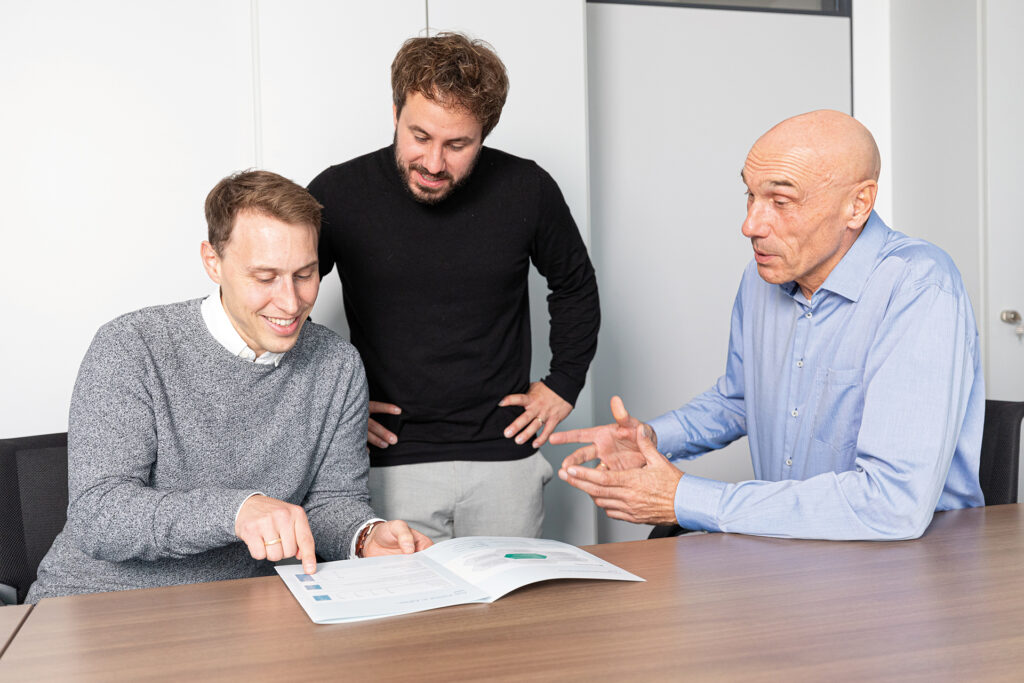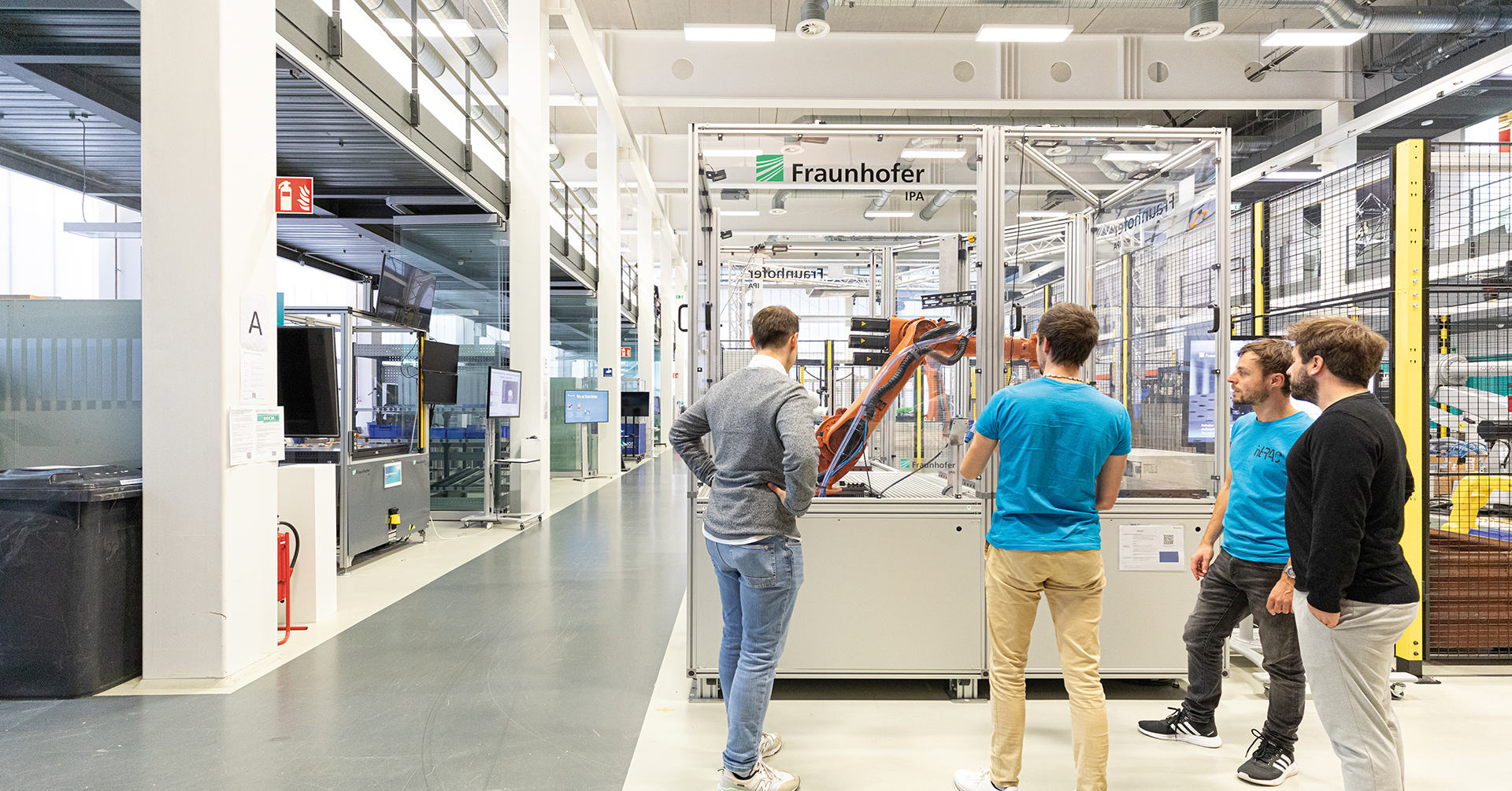Source: Fraunhofer IPA/Photo: Rainer Bez
Spin-offs – systematically launched
First and foremost, Fraunhofer IPA is a research institute. But: It is also a birthplace for spin-offs. start-up support team is systematically driving this forward.
“We act almost as obstetricians,” says Christian Kurrle about himself and his colleagues Stephan Nebauer and Christoph Schaeffer. However, they do not work in the hospital, nor are they infants who are paving their way in life. Rather, they help to “give birth” to start-ups that bring technologies out of Fraunhofer IPA to the market. “From the seed cell of an idea, technologies develop on the basis of which small corporate embryos are created. These must be well-bedded and packed until they can stand and run independently at some point and have their own legal form,” says Nebauer. These obstetrics are extremely important for Germany – after all, spin-offs are a crucial part of innovation centers. The young companies are to drive progress and help to overcome urgent social and environmental challenges. However, according to Bitkom, the number of spin-offs in Germany still have a way to go.
Systematically drive spin-offs forward
Fraunhofer IPA, however, is doing well. “Since 2015, we have had an average of two spin-offs per year. This makes us one of the Fraunhofer Institutes with the highest number of spin-offs,” says Schaeffer. This is not by chance. Kurrle, Schaeffer and Nebauer, supported by the institute’s management and the Fraunhofer headquarters, systematically drive spin-offs forward. From the start: Already at the official welcome, new employees learn not only how to advance a scientific professional or management career at the Fraunhofer IPA, but also how to learn entrepreneurship themselves and subsequently embark on a founding career at the institute.
The start-up support team is also always on hand to assist scientists on their way to incorporation. “We are guided by the technology lifecycle,” explains Kurrle. “How Is an invention turned into a product that is put on the market?” First of all, it is important to inform and train future founders – for example, through a program that imparts market-economy skills and gives scientists concrete tools to hand, and how their ideas could be used for business purposes.
If you are flirting with taking the first steps in a new direction, role models are also extremely important: At the start-up breakfast and the like, interested parties can exchange information with people who have already dared to take this step out of the Fraunhofer IPA and are now successfully heading a spin-off. The range of services is complemented by road shows, which are organized jointly with the Fraunhofer headquarters – more precisely with the colleagues of Fraunhofer Venture and the employees of the transfer funding program AHEAD. What funding opportunities are available within and outside the Fraunhofer-Gesellschaft? Who are the respective contact persons? “Following the roadshow in June 2023, seven applications for the next AHEAD round arrived on our desk,” Kurrle said. The key questions for every spin-off are patent and license law. Who owns the invention? Who is allowed to use it? “We can be reached by the teams at any time, for small and large questions,” says Kurrle. This applies both to formal claims, compliance, regulatory or industrial property rights as well as questions about content.
“The key technical ideas are largely great. However, there is often a lack of market maturity. It is also often lacking the business model, the right market entry strategy or the team,” summarizes Nebauer. “We analyze the ideas that are brought to us in terms of feasibility, identify the market readiness, draw up a roadmap and gradually expand the particular strengths of the start-ups over months or years.”
Networking at the Stuttgart campus
However, in addition to internal support, it also needs appropriate external contacts in order to get a company up and running. After all, the company embryos have different needs in the different phases, which the Fraunhofer IPA cannot cover alone: Office space and laboratory rooms, investment, funding training or assistance in writing applications such as EXIST from the Federal Ministry for Economic Affairs and Climate Protection. “This is where our networking at the Stuttgart campus is effective,” reports Kurrle. “The Startup Campus 0711 network – in which the Fraunhofer IPA is a central, equal player – provides founders with the necessary contacts, for example to incubators that rent out space.” For example, Startup Campus 0711 has built up a database for start-ups through which they can search for investors and network with each other.

Start-up aid from the Fraunhofer-Gesellschaft
The support of the Fraunhofer headquarters is also fundamental to the success of start-ups. “We pot the young plants and water them well, while the programs of the Fraunhofer-Gesellschaft promote further growth – so we work hand in hand with the headquarters,” says Schaeffer, one of the guarantors of success. After all, the success of a start-up requires not only innovative ideas, which have been developed at Fraunhofer IPA and are handed over with a license contract with a cost structure compatible with the founders, but also a team that covers all the necessary skills, including business management, product marketing and accounting, but also a business model, mentors and investments.
In phase one, i.e. the general consideration of a spin-off, the Fraunhofer-internal transfer funding program AHEAD should be mentioned above all. “In a four-day boot camp, the teams can get to know each other and promote their entrepreneurial, customer-centered actions,” reports Julia Bauer, who oversees the program at the Fraunhofer headquarters. “At the end of the camp, a jury decides which teams will be admitted in funding phase one: These will each receive 50,000 euros in order to advance the project further and to cover personnel costs, for example.” If the teams have reached phase two and thus “operating temperature”, as the head of Fraunhofer Venture, Thomas Doppelberger, put it – so it is clear that they really want to spin off – the support of Fraunhofer Venture is effective.
“We take the start-up teams in all business management and legal questions to hand, and a team of advisors consisting of business economist and lawyer cooperates closely with the start-up team and institute,” says Doppelberger. “Sometimes the Fraunhofer-Gesellschaft also participates in the start-ups and acts as a co-investor and co-shareholder.
Win-win situation for Fraunhofer and founders
But isn’t it counterproductive for Fraunhofer Institutes to lose some of their best minds to start-ups? “We want to promote our employees and see their success,” says Schaeffer. “If a spin-off is planned correctly, it will never be an obstacle for Fraunhofer.” Such a profitable planning includes the question of what the start-up’s future cooperation with Fraunhofer should look like. The cooperation provides benefits to both sides: The start-ups benefit from the collaboration with Fraunhofer IPA and the creation of new intellectual property (IP), while 40 percent of Fraunhofer IPA’s license income comes from former start-ups.
Success stories from Fraunhofer IPA
Royalty revenues, to which the latest spin-off Assemblio GmbH contributes, for example: It supports companies in generating assembly instructions for the workers from CAD data. Alexander Neb has fully developed the underlying technology in his – excellently completed – dissertation. “A great example of a founding career: Alexander Neb has already won the first prizes. Customers are also enthusiastic. His start-up already has more requests than it can handle,” says Schaeffer with pride in his voice.
The spin-off Vibrosonic GmbH has already been around for a much longer time: For more than ten years now, everything has been revolving around an ear contact lens®. The medical approval procedures have been completed, major investors have been found. Since the hearing contact lens® is applied non-invasively directly to the eardrum, it could revolutionize the hearing aid landscape in a similar way to the contact lens of vision.
Fast Forward Discoveries GmbH is dedicated to a completely different topic: The aim here is to open up the micro-area of cells via a mill in such a way that it can be used for the development of drugs or vaccines. A series founder from outside has spun off this start-up together with our colleagues – this fulfills his plans optimally with regard to the number of units sold,” says Schaeffer enthusiastically.
Other teams are currently in the product development phase, according to WSDi – Wertstrom Digital, which is funded by the AHEAD program. Can value stream analysis, which optimizes processes in factories, also be used, for example, to improve traffic data in the city? The team is on the verge of finding a suitable application case for the spin-off,” says Nebauer.
Make good even better
These examples may give an impression of spin-offs that originate from Fraunhofer IPA. “Fraunhofer IPA has a pioneering role in terms of spin-offs,” confirms Doppelberger. But what is good can get even better – according to the ambitious motto. Next year, a reorganization is therefore on the agenda: The foundation support unit at IPA is being expanded into a profitable incubator, in other words, into an independent business unit that is economically self-sufficient. “Accordingly, it is planned to expand the team and significantly expand the existing services for those interested in starting up, including the organization of matchmaking events with investors and suitable industry partners, pitch training, infrastructure, etc.,” Nebauer reveals. “In the future, we want to collect our colleagues even more and proactively query them: Who is interested in starting up with the following IP of the IPA?” says Kurrle. “Our purpose: We want to be even more proactive with spin-offs in the future.”
Your contact persons
Stephan Nebauer
Head of Start-up Incubator
Phone: +49 711 970-1291
Christoph Schaeffer
Head of Business Segment Patents and Licenses
Phone +49 711 970-1212
Christian Kurrle
Employee Mitarbeiter of Business Segment Patents and Licenses
Phone: +49 711 970-3646
